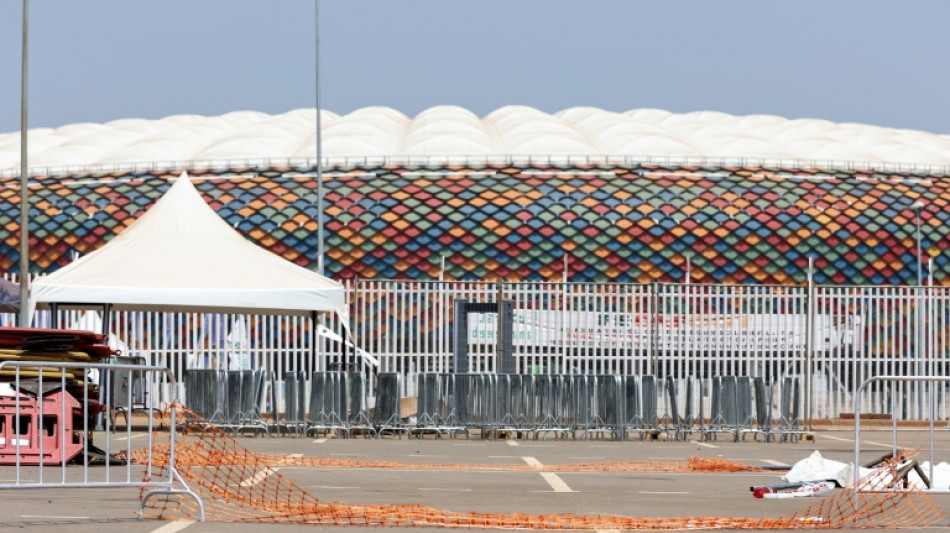
-
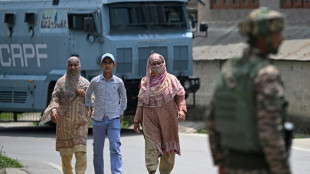 Pakistan shoots down 25 Indian drones near military installations
Pakistan shoots down 25 Indian drones near military installations
-
Xi meets Putin in Moscow as Ukraine reports truce violations
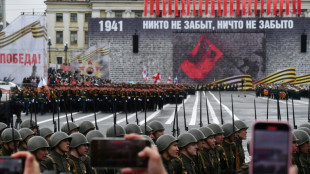
-
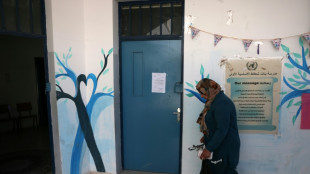 Israel forces close UN schools in annexed east Jerusalem
Israel forces close UN schools in annexed east Jerusalem
-
Trump to announce 'trade deal' with UK

-
 'Jumbo': the animated Indonesian film smashing records
'Jumbo': the animated Indonesian film smashing records
-
Stocks rise on trade hopes, London boosted by reports of deal

-
 Emirates airline group announces record $6.2 bn gross profit
Emirates airline group announces record $6.2 bn gross profit
-
Accused mushroom murderer sent children to movies before deadly meal

-
 Nintendo forecasts 15 million Switch 2 sales in 2025-26
Nintendo forecasts 15 million Switch 2 sales in 2025-26
-
Australian Greens chief loses his own seat
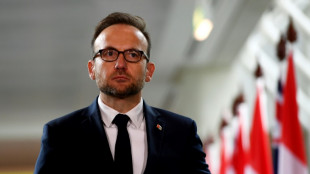
-
 Toyota cites tariffs as it forecasts 35% net profit drop
Toyota cites tariffs as it forecasts 35% net profit drop
-
Wolf protection downgrade set for green light in EU

-
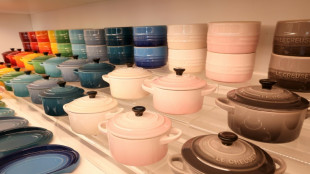 Global cult following keeps Le Creuset simmering
Global cult following keeps Le Creuset simmering
-
Austria's JJ makes operatic pop soar at Eurovision

-
 Toyota cites tariffs as it forecasts 35% drop in 2025-26 net profit
Toyota cites tariffs as it forecasts 35% drop in 2025-26 net profit
-
Depoliticising Eurovision 'impossible', experts say

-
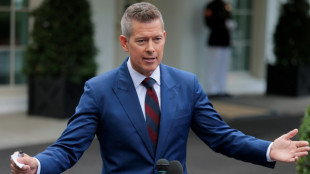 Trump official to unveil ambitious US air traffic control upgrade
Trump official to unveil ambitious US air traffic control upgrade
-
India and Pakistan trade fire after deadly escalation
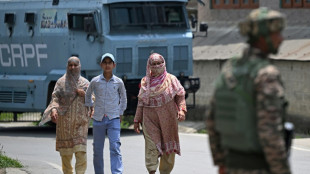
-
 Knicks rally again to take 2-0 lead over Celtics, Thunder roar back
Knicks rally again to take 2-0 lead over Celtics, Thunder roar back
-
What the shell: scientists marvel as NZ snail lays egg from neck
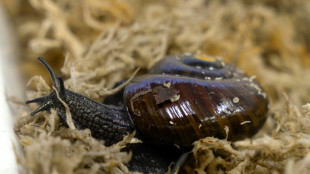
-
 Eurovision week's opening parade set to start the party
Eurovision week's opening parade set to start the party
-
Trump to announce trade deal with UK on Thursday: US media

-
 Dhoni says 'nothing to decide now' over retirement plans
Dhoni says 'nothing to decide now' over retirement plans
-
A bitter return for Iraqis kicked out of Europe
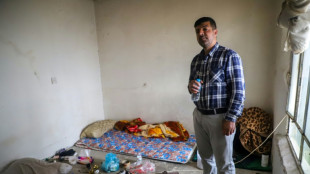
-
 Stocks rise further on growing trade deal hopes
Stocks rise further on growing trade deal hopes
-
Filipino pope could revive priestly vocations in Catholic bastion

-
 NZ Rugby posts $11.6 mn loss, admits financial model 'not sustainable'
NZ Rugby posts $11.6 mn loss, admits financial model 'not sustainable'
-
NZ Rugby posts $19.7mn loss, admits financial model 'not sustainable' financial model

-
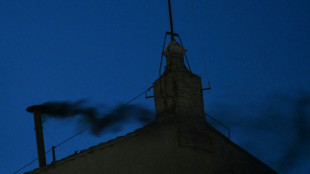 All eyes on Sistine Chapel chimney as conclave enters day two
All eyes on Sistine Chapel chimney as conclave enters day two
-
Digital voting breeds distrust among overseas Filipino workers

-
 Bank of England set to cut rate amid Trump's tariffs
Bank of England set to cut rate amid Trump's tariffs
-
Trump tariff plan brings Hollywood's struggles into focus

-
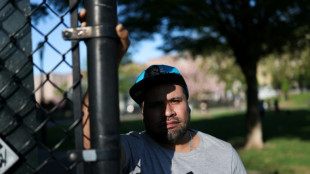 'Dream turned nightmare' for Venezuelan migrant deported from US by Trump
'Dream turned nightmare' for Venezuelan migrant deported from US by Trump
-
Hemogenyx Pharmaceuticals PLC Announces Placing to Raise £451,250 and Director’s Dealing

-
 Agronomics Limited - Liberation Labs Announce Manufacturing Partnership
Agronomics Limited - Liberation Labs Announce Manufacturing Partnership
-
Malaysia Cybersecurity Center of Excellence Marks First Anniversary with New Partnerships, Scholarships and Expanded Programs

-
 California leads lawsuit over Trump's EV charging funding change
California leads lawsuit over Trump's EV charging funding change
-
Meta blocks access to Muslim news page in India

-
 PSG are deserving Champions League finalists, says Luis Enrique
PSG are deserving Champions League finalists, says Luis Enrique
-
Bolsonaro leads rally at site of 2023 Brazil insurrection

-
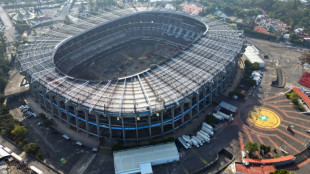 Mexico City prepares to welcome millions for 2026 World Cup
Mexico City prepares to welcome millions for 2026 World Cup
-
Putin's order for three-day truce with Ukraine enters force

-
 Defiant Arteta says Arsenal were best team in Champions League despite painful exit
Defiant Arteta says Arsenal were best team in Champions League despite painful exit
-
US envoy Witkoff briefs UN Security Council on Gaza, other issues

-
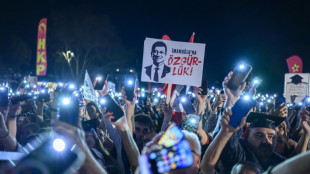 Tens of thousands take part in Istanbul rally for jailed mayor
Tens of thousands take part in Istanbul rally for jailed mayor
-
Pakistan warns will 'avenge' deaths from Indian strikes

-
 US Fed pauses rate cuts again and warns of inflation, unemployment risks
US Fed pauses rate cuts again and warns of inflation, unemployment risks
-
New accuser testifies against Weinstein in New York retrial

-
 Merz supports easing EU fiscal rules to boost defence spending
Merz supports easing EU fiscal rules to boost defence spending
-
PSG finish off Arsenal to reach Champions League final


Olembe tragedy scars legacy of Cameroon's Cup of Nations
The Africa Cup of Nations which finishes this weekend in Cameroon will remain forever scarred by the crush which killed eight people at the Olembe Stadium after a month in which the tournament's organisers struggled from one problem to another.
The spectacular 60,000-seat Olembe Stadium in the capital Yaounde was built to be the jewel in the crown of Cameroon's Cup of Nations, at an official cost of some 163 billion CFA francs ($284 million).
Its name will now always be associated with the events of January 24, when eight died and 38 were injured in the crush and stampede at the stadium's southern entrance gate.
The ground was temporarily closed but reopened 10 days later for the semi-final between Cameroon and Egypt, yet the disaster put people off to such an extent that only 24,371 people attended that match.
That was just 40 percent of capacity, when up to 80 percent of seats could have been filled in line with Covid-19 restrictions in place for the tournament.
"When people die it makes everybody afraid," one supporter, Valentin Kamga, told AFP as he made his way to the stadium for its reopening.
Cameroon will struggle to shake off the legacy of Olembe, despite the hugely stepped-up security subsequently put in place.
"Moments of joy can be accompanied by moments of sadness," Cameroon legend Rigobert Song told AFP. "There is a feeling of sadness but it is part of life."
- Delays -
Cameroon had been afforded plenty of time to get ready to host its first Cup of Nations since 1972.
It was supposed to host the competition in 2019 only to be stripped of the tournament due to delays in preparations, with Egypt stepping in.
The Cup of Nations was then postponed last year because of the pandemic.
Yet still not everything was ready, and media facilities at the stadium in Limbe were never completed by the time the action started.
Local organisers were not helped by the Confederation of African Football, which decided with just four days' notice to strip the Japoma Stadium in the economic capital of Douala of a quarter-final and a semi-final, moving both to Yaounde.
There were concerns about the state of the pitch, but no official explanation for the change was ever offered, and CAF also decided at the last minute to bring forward the third-place play-off by a day.
The tournament was plagued by poor attendances, even in this football-mad country.
CAF imposed strict conditions to enter stadiums, with supporters needing to be fully vaccinated and provide proof of a negative test, enough to deter many in a country with low vaccination rates.
Crowds did improve as the tournament progressed, but the Olembe disaster appeared to be the final straw for many.
- Lessons for next year -
There have been plenty of uplifting moments, from Burkina Faso's run to the semi-finals despite a military coup at home, to tiny Gambia reaching the last eight in their debut appearance.
Fellow minnows the Comoros made the knockout stages and only lost narrowly to the hosts despite having to play an outfield player in goal after being ravaged by Covid cases.
That evening, however, was quickly overshadowed by the disaster unfolding outside at Olembe.
"In sporting terms we saw some great matches, but we didn't get the best two teams in the final," Cameroon's 1990 World Cup star Roger Milla told AFP.
Despite the presence of world-class players like Egypt's Mohamed Salah, Senegal's Sadio Mane and Algeria's Riyad Mahrez, the football on the field did not always match expectations.
There were just 100 goals scored in 51 games before the final, an average of 1.96 per game -- identical to the 2019 edition.
On the field but especially off it, the hope is that the next Cup of Nations proves more uplifting.
There is not long, with the Ivory Coast set to host the tournament in June and July 2023, just six months after the World Cup in Qatar and during the rainy season, which may bring its own challenges.
P.Stevenson--AMWN